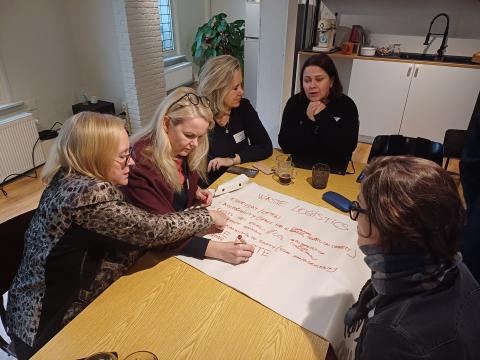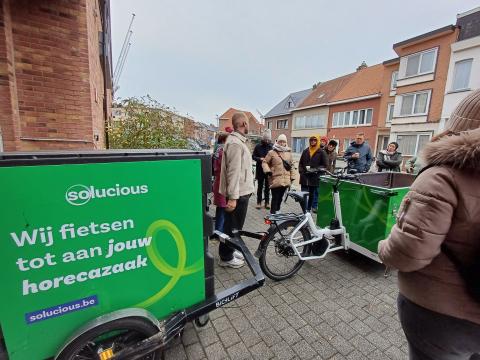SPOTLOG successful EoE in Belgium for a greener logistics!

The SPOTLOG 5th Exchange of Experience Event was held in Mechelen, Belgium, between December 10th and 11th, organised by the City of Mechelen. The two-day event was intense in sharing experiences and discussions to foster more sustainable last-mile deliveries, bringing together project partners, stakeholders, and experts to discuss innovative solutions for sustainable urban logistics, involving 24 in-person participants, under the theme “Scaling up innovative urban logistics solutions”.
The first day was opened by a representative of the host Mechelen with a short introduction on the city, a vivid and popular one that has attracted many new residents, entrepreneurs, visitors and tourists over the last years, resulting in a growth in traffic and goods flows.
The introduction was followed by a short interactive workshop where all the participants got to know each other better to enhance the experience sharing.

Jorge Bandeira from the University of Aveiro, SPOTLOG lead partner, then presented a comprehensive overview of the SPOTLOG project's policy achievements so far. For example, Mechelen implemented a zero-emission vehicles test fleet in cooperation with logistics companies in preparation of the installation of a zero emission zone for logistics.
The morning was closed with interesting presentations by SPOTLOG partners.
Veerle De Meyer from Mechelen presented how it is needed to scale up after a period of implementing pilot projects. Via the concept of the transition curve she explained that first a period of stimulating projects and measures is needed to accelerate transition. But the curve shows that after a certain period of stimulation the effects reduce and that it is then needed to work on regulation to really realise a scale-up effect.
Adrian Cacun and George Lupascu were then invited to give an update on the SUMP for Constanta, Romania. With the SUMP vision for 2030, Constanta wants to achieve a sustainable, safe, integrated and accessible to all transport system, connecting people and places, supporting economy, environment and quality of life.
Dominika Grodkowska and Anna Sitarska, MAE, closed the morning session with a presentation on the clean transport zone of Warsaw, Poland. Warsaw, like many modern cities, faces challenges with air pollution caused by high traffic levels and older, high-emission vehicles. The Clean Transport Zone aims to tackle these issues by reducing harmful emissions in the most congested areas of the city.

In the afternoon an interactive workshop was organised under the professional guiding of Roel Gevaers, professor at the University of Antwerp Management School (UAMS).
He started with showing how the different goods flows are represented in the totality of flows. We see that the delivery of parcels is often over estimated and the part of construction logistics is often under estimated. The group was then divided in smaller groups and for each type of goods we were asked to formulate some SULP guidelines.
The second day of the event featured a study visit with a focus on micro-consolidation hubs and cargo bike systems. After a short visit of the inner city, we visited Foodsprint by bike. Foodsprint is a cyclelogistics company that delivers refrigerated goods. After that we visited the City Hub from where the local bike courier company Ecokoeriers operates. They have been around for 10 years now and can say now that, although the start was hard, they are profitable.

Overall, the 5th Main Interregional Exchange of Experience Event in Mechelen was an important moment towards policy improvement, demonstrating the challenges but also some inspiring opportunities behind the urban logistics ecosystem. Pilot projects in urban logistics are valuable early-stage initiatives as they provide an opportunity to test innovative ideas and technologies in a controlled environment. They help to gain practical insights into the feasibility, benefits and challenges of new approaches to urban logistics. However, while pilot projects are essential for collecting data and testing concepts, they cannot provide the full solution in the long term. After an initial phase of experimentation, policies are needed to implement these initiatives on a larger scale and embed them in the urban ecosystem. Policy interventions provide the necessary infrastructure, regulation and cooperation between different stakeholders, which is essential for scaling up successful pilot projects. Without such policy interventions, it is difficult to realise the desired impact in the wider urban context, making the success of urban logistics dependent on both innovative pilot projects and robust policy frameworks.